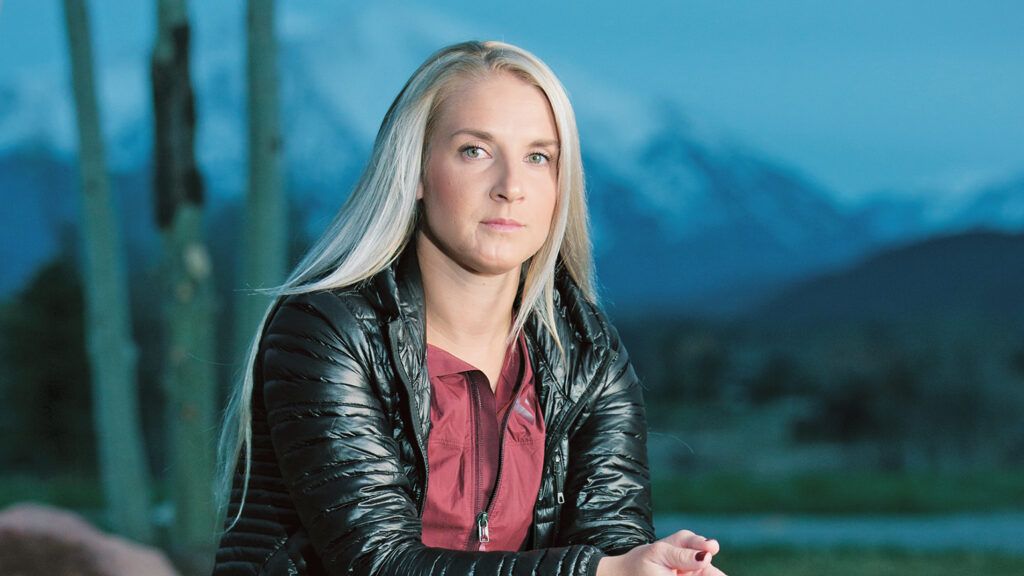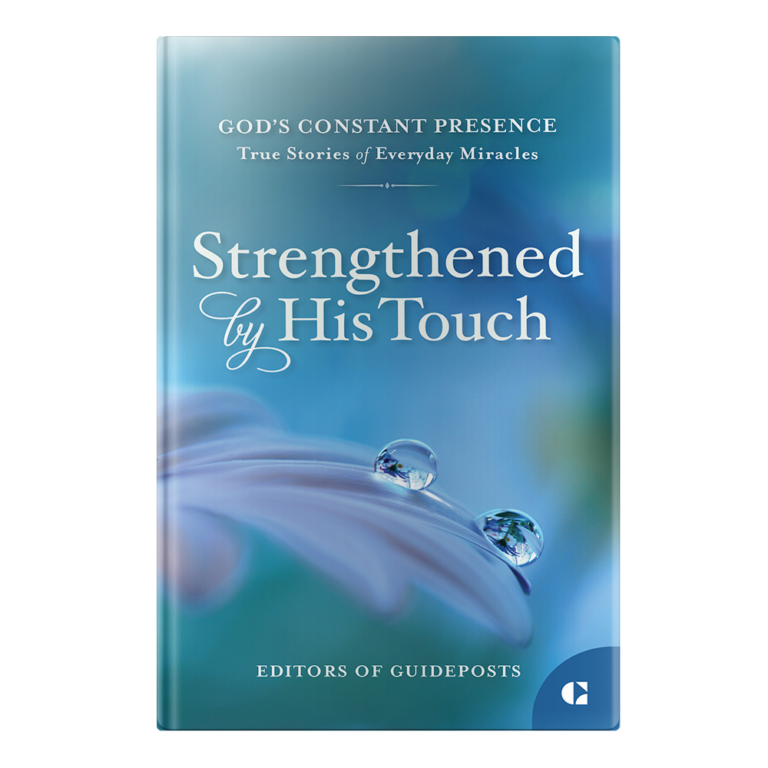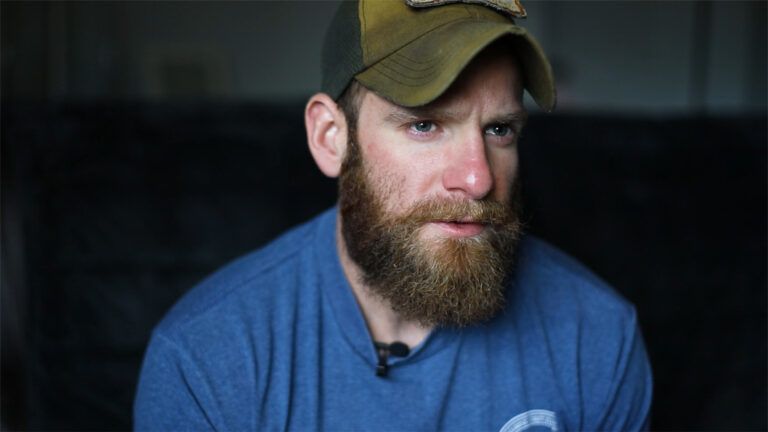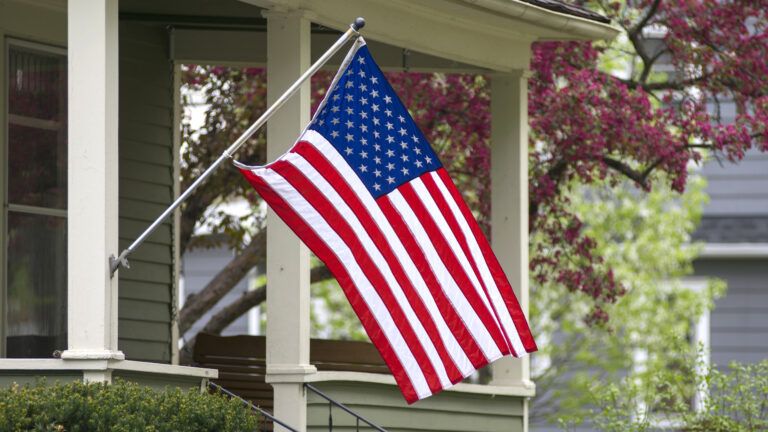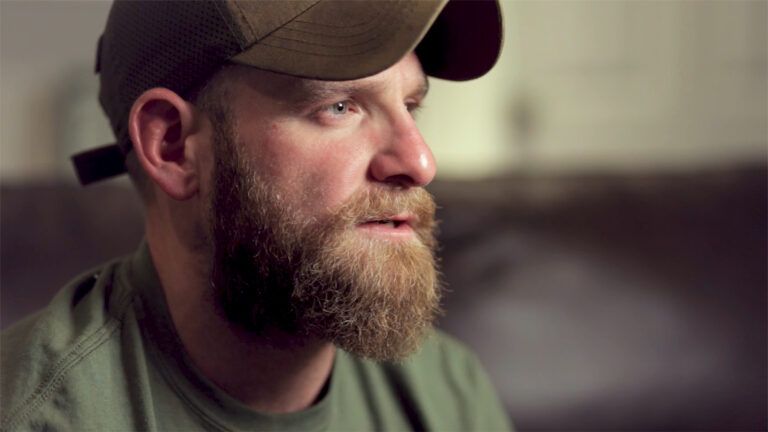I celebrate it like it’s my birthday, and in a way it is. Facebook has it down; my family will never forget; my friends call. June 23, the day my helicopter in Afghanistan crashed, is my Alive Day. Because I’m alive, savoring every moment, stoked about all that I can do—snowboarding, climbing the world’s tallest peaks—looking forward to what’s still ahead. But it is also the day on the calendar my life nearly ended. Twice.
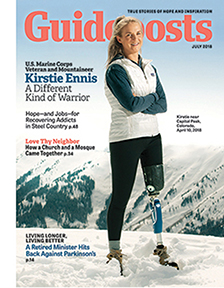
Guideposts
June 23, 2012. Four years into my service in the Marines, on my second tour of duty in Afghanistan, I was a door gunner on our Sikorsky CH-53D helicopter in Helmand province. We were resupplying ammunition and transporting soldiers when the helicopter went nose up and fell from the sky. Tethered to the floor with my gunner’s belt, I couldn’t move. In those brief terrifying seconds, all I could do was pray.
The helicopter smashed into the ground. I’m gonna die, I thought. Everything went black—I don’t know for how long. When I opened my eyes, all I could hear was screaming. I couldn’t breathe because of the blood clogging my nose and throat. My teeth were basically gone. So was half my jaw. Then a medic rushed to me. “Stay awake,” he shouted. I wondered how long since we’d crashed, who else had survived.
They wouldn’t give me painkillers—they were afraid how it would affect my rattled brain. I might have traumatic brain injury. My spine was damaged, my left leg useless, muscles torn, bones shattered.
They operated on me first in Afghanistan. I was medevaced to Germany and then Walter Reed for more surgeries. Not till I was airlifted to Balboa Medical Center in San Diego did I see my family. My mom, dad and little sister drove in from Florida. I looked at them and couldn’t understand. Was that Mom? Was that Dad? What were they doing here? Why wasn’t my brain helping me sort this out?
My dad started crying. My dad never cries. Tears streamed down his cheeks. “This is the happiest day of my life,” he said. “I got my kid back alive.”
All I’d ever wanted to be was a warrior. Like him. He’d served in the Corps. Mom enlisted too when I was four, old enough for me to see her graduate from boot camp. At her graduation, I wore a T-shirt—my favorite of all time—that said, “My mom is a U.S. Marine.” I had Barbie dolls like other girls. I decked them out in dress blues and combat fatigues. That’s where I was at.
At 17, I said to my parents, “I want to enlist.” I had graduated high school and was taking some college classes. In my heart, I knew it wasn’t what I wanted. I wanted to serve in the Marines. Note: Serve was the operative word. “I’ll stick to a desk job to start out,” I promised my dad. Nothing dangerous.
The day I left for boot camp, the recruiter let it slip to Dad that I’d signed up for helicopters. My father didn’t speak to me for weeks. But what could he do? I was a Marine. It made him proud. I couldn’t stay in touch much when I was deployed, but my family knew what my situation was. They understood the dangers, maybe better than I did. Still, nothing could have prepared them for the crash. One moment I was in the air, a tough Marine gunner. The next I was broken, body and mind.
San Diego was my new home. More surgeries. I was determined to recover so I could go back and fight. I did all the physical and occupational therapy. I worked my tail off. I wanted everyone to think I was a good patient. So I could go back into battle.
But nobody could explain what was going on inside my head. I couldn’t recover words. Huge chunks of my memory had vanished. I had to do speech therapy. I was jumpy, anxious, besieged by flashbacks. The slightest noise, the rumble of a truck passing by, and I was back in the helicopter shattered on the ground, blood pouring from my mouth.
I would stare across the desk at some counselor or therapist and wonder, What do you know about PTSD? Can you tell what pain I’m in? Do you know what it’s like to almost die?
The more conscious of my injuries I became, the worse off I was. Depression pulled me down. Maybe I wasn’t a warrior at all. As time passed, I could run again, speak again, ride a bicycle, eat and chew, but I’d never be able to fight again. Never serve.
My first Alive Day came up, and I became convinced there was nothing left for me to live for. That day, June 23, 2013—I won’t go into details—I attempted to take my life.
This time when Dad visited me in the hospital, he didn’t cry. He was mad. “The enemy couldn’t get rid of you, and you’re going to do it to yourself?” I had no prayers left in me. Just a burning anger. “God, I don’t have any purpose anymore,” I raged. “I’m nothing.”
One day people from Disabled Sports USA asked me if I would be interested in snowboarding.
Snowboarding? Really? That was nuts. I could barely put weight on my left leg. The pain was relentless. But the thought of being back outside called to me. And the freedom. I got cleared by the medical staff and fitted out with a special boot and a board.
That first time rocketing down a mountain? Sheer bliss! The cold wind stinging my face, the adrenaline rush, the solitude. This was something I could love even if I was in pain! Maybe I’d train for the Paralympics or the Warrior Games. I could still be a warrior like this. I had my doctors and therapists in San Diego, but I spent as much of the winter as I could in Colorado. On the slopes.
Eventually I had to retire from the Corps. With just a signature on some papers, I was out. I thought it would kill me. I wondered what was next and asked God to stay by me.
That summer, my surgeons told me they’d need to amputate my leg. “Not till the fall,” I insisted. I’d signed up to do a thousand-mile walk across Britain with a small group of wounded vets through the valleys and heather-covered dales of Scotland, Wales and England. Walking With the Wounded. Seventy-two days outdoors, 12 to 15 miles a day.
“How will you do that?” they asked.
One step at a time. The only way I could do anything. It sounded crazy even to me, but I wanted to honor my brothers and sisters who weren’t as lucky as I was. The fallen warriors, their heartbroken families. “I got my kid back alive!” I remembered my father saying. With a heavy brace on my left leg, I started out. I brought along dog tags I had made of 25 Marines, each with their name, rank, KIA or RIP, and the conflicts they were in. Every 40 miles, I’d pause, read a poem and leave a dog tag.
We faced wild weather: raging winds and cold rain. Then beautiful sunny days through sheep-filled meadows. We climbed the tallest peaks in the UK: Ben Nevis in Scotland, Snowdon in Wales and Scafell Pike in England. Prince Harry joined us en route.
Yes, him. The local press had a lot of fun with that, and you can bet we didn’t let him off the hook when he complained about pain in his knees. “Your knees hurt?” I would say after a 15-mile hike. “You’ve got to be kidding, Harry.” But he’d served too. A fellow warrior. In fact, we talked about being at Camp Bastion at the same time.
Some days were agony. I had to push myself beyond my limits. But when you do that, you discover how much further you can go. Like I said, I don’t pray anymore. But I do talk to God. I have conversations. When I thought I couldn’t take the pain anymore, I’d tell him. Better to take it out on him than on me.
At the hike’s end, I went in for my thirty-ninth surgery: the amputation of my leg below the knee. I sort of hoped this would be my last operation. They could fix me up with a prosthesis, and I could get back my snowboard.
Things didn’t go exactly as planned—you’d think I would have learned that by now. A nasty infection developed. I had to have one more surgery. This time I’d lose my knee. It’s a lot harder to balance on a prosthesis above the knee, but nothing—no loss of any limb—was going to stop me from snowboarding again. When it comes to the body, it’s what’s between the ears and beneath the rib cage that counts.
I divide my time now between San Diego—my docs—and Colorado—the slopes. The higher altitude is good for another of my dream projects: to summit the tallest peak on each of the seven continents. So far I’ve done Kilimanjaro (19,341 feet) in Africa and Carstensz Pyramid in Indonesia (16,024 feet). I trek to Nepal next year to attempt Mount Everest (29,029 feet), the highest point. Heck, I’ve been to the lowest. Why not take myself to the highest?
This June 23, I’ll be on our own continent, on my quest to summit Alaska’s Denali. Celebrating being alive. Celebrating being a warrior.
For more inspiring stories, subscribe to Guideposts magazine.
